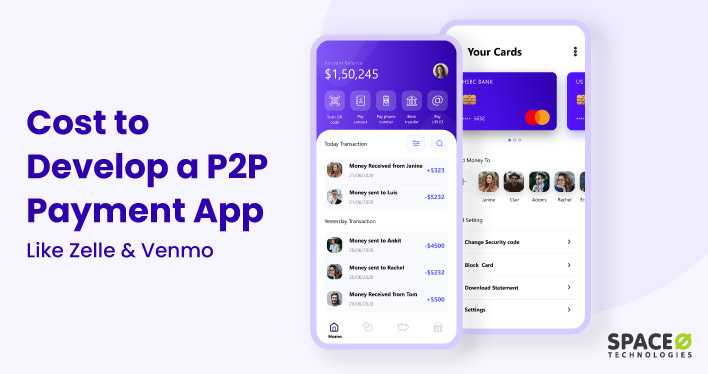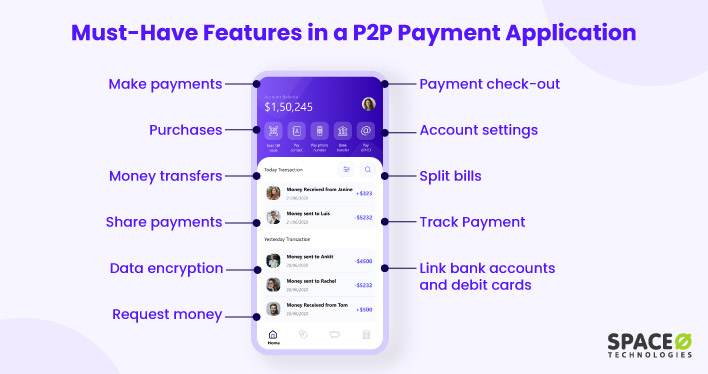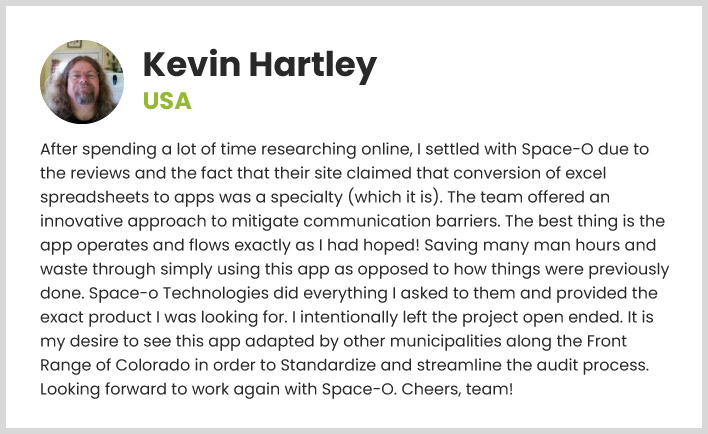Did you just Google the cost to develop P2P payment apps like Venmo?
If yes, your search ends here. This blog provides you with the complete bifurcation to develop an app like Venmo and Zelle.
The cost of P2P payment apps like Zelle and Venmo app starts from $25000 with all the basic functioanlity. However, the cost depends on factors like app complexity, features to be integrated, the team you hire, and the location of app development.
Being a leading mobile apps developer company in the USA, we know what can be the cost to build clone apps like Venmo.
So, here, in this blog, we have provided a detailed breakdown of the cost to build an app like Snapchat.
By the end of this blog, you will know:
- Cost to build a simple, medium, and complex P2P payment app clone
- Factors that impact the cost of P2P payment app development
- 5 ways to reduce the cost of P2P payment app
Table of Contents
Cost to Create P2P Payment Apps Like Zelle and Venmo [A Detailed Bifurcation]
Since we have been a leading mobile application development service provider for more than a decade, we know what kind of features to integrate and what can be the cost to develop simple, medium, and complex mobile payment apps.
Here in the below table, you will understand the rough timeline and cost to develop an app like Zelle and Venmo.
| P2P Payment App Types | Must-have Features of Venmo and Zelle Mobile Payment Apps | Final Cost of P2P App Development | Timeline of Payment App Development |
|---|---|---|---|
| Simple App (Basic Features) |
| $25,000 – $35,000 | 2-3 months |
| Medium App (Slightly advanced features) |
| $35,000 – $45,000 | 4-7 months |
| Complex App (Highly advance features) |
| Starts from $50,000 | 8-12 months |
This is the general cost of creating a P2P payment app. The cost to develop P2P payment apps varies based on the factors like complexity of the app, the location of the P2P app development, and the development approach you choose.
Here is a simple formula (refer to it as an app development cost calculator) to calculate the cost of P2P app development.
Since you know the tentative cost with features; let’s understand the factors that impact the cost of this P2P payment app development.
Looking to Develop a Payment App?
Let’s get in touch. Our app developers have experience in creating a P2P payment apps on Android and iOS platforms.

Which Factors Impact Cost to Develop P2P Payment App?
Let’s take an in-depth look at all the below factors and how they impact the overall app budget.
Payment App Development Platform – iOS/Android/Cross-platform
The cost of payment app development varies depending on the specific platform you choose, as each one has its own unique development process and technical requirements. Here is a table of the cost to build iOS, Android, and cross-platform Zelle and Venmo app.
For the below table, we have considered a minimum rate of $15 per hour and a maximum of $25 per hour.
P2P Payment App Development Platform (Basic Features) Payment App Development Time Payment App Development Cost iOS payment app development 900-1300 hours $13,500 to $32,500 per platform Android money transfer app development 800-1200 hours $12,000 to $30,000 per platform Cross-platform payment app development 1000-1350 hours $15,000 to $33,750 both the platform Even iOS, Android, and cross-platform payment app development depend on a few factors. Let’s understand.
iOS Development: The cost of developing an iOS app can be higher than other platforms due to several reasons, such as:
- Limited hardware options: iOS runs only on Apple devices, which reduces the number of devices to test and develop for, but requires additional development time to ensure compatibility across all iOS versions and device sizes.
- Development tools: iOS apps are typically built using Xcode, Apple’s native development environment. This requires specialized training and expertise, leading to higher development costs.
- App Store requirements: Apple has strict guidelines for apps to be published on the App Store, which requires developers to en the app is up to par with the company’s standards. This adds additional development time and costs.
Android Development: The cost of developing an Android app can vary depending on several factors such as:
- Fragmentation: Android runs on a wide range of devices with different screen sizes, resolutions, and specifications, which creates compatibility issues and require additional development time to ensure the app is optimized for all devices.
- Development tools: Android apps are typically built using Android Studio, a popular development environment that is free to use. However, developers need to invest in additional tools and resources to optimize the app for different device types.
Cross-platform Development: The cost of developing cross-platform P2P payment apps can vary depending on several factors such as:
- Development tools: Cross-platform app development requires specialized tools such as React Native, Flutter, or Xamarin, which may require additional time and resources for developers to become familiar with and optimize for the app.
- Compatibility: Cross-platform development can reduce the need for developing separate versions of the app for each platform, but it may require additional development time to ensure the app is compatible across all operating systems.
- Performance: Cross-platform apps may not perform as well as native apps on certain devices, which requires additional development time to optimize the app for different devices.
By considering the above factors, you will know how much it can cost to develop a payment app on iOS, Android, and cross-platform. The platform you choose has a significant impact on the cost and success of your mobile payment app.
The platform you choose can have a significant impact on the cost and success of your app, so it’s important to take the time to carefully evaluate your options and make the best choice for your specific needs and goals.
UI/UX Design Needed for Your P2P Payment App Development
Check the following table to know the cost to design P2P payment app.
Profile Designing Stage Timeline Business Analyst Planning & Analysis 1-2 weeks Wireframing & Prototyping 3 weeks Low-fidelity Wireframe 1-2 weeks High-fidelity Wireframe 2-3 weeks UI/UX Designers App Designing 2-3 weeks Prototype 4-5 weeks The above table describes the cost to develop wireframe and UI/UX. Apart from this, there are other several factors that impact the cost of design development. First, let’s understand how the design cost is calculated.
To calculate the total cost of design, consider the following formula.
Total hours of design * hourly rates of developers = Total app design costLet’s understand how to calculate the cost of design.
For example: Let’s take the hourly rate of an app designer as $25 and the total hours to design an app takes 100. So, the cost would be $3500.
100 X $35 = $2500
Now, let’s understand the other factors that impact the cost of UI/UX designing.
- Customization: The level of customization needed for the app’s design. Customizing the complex design is a time-consuming process and requires a high level of expertise. This increases the cost of mobile payment app development.
- Branding: P2P payment apps need to establish a unique brand identity to differentiate themselves from the competition. Branding requires additional resources and time, which adds up to the cost of development.
- Responsive design: With the rise of mobile devices, it is important for the P2P payment app to have a responsive design that fits different screen sizes and resolutions.
- Iterative design process: The iterative design process involves multiple rounds of prototyping, testing, and refining. The process requires time which can increase the cost of development.
App developers carefully consider all these factors when estimating the cost of P2P payment app development. A well-designed app can lead to a better user experience and increased user engagement, which can be crucial to the success of a P2P payment app.
Key Features to Integrate Into Your Custom Peer-to-Peer Payment App

As discussed, the features to integrate into the P2P payment app can make a huge difference in determining the cost of the payment development application. So, if you want to integrate the features like Venmo and Zelle, here is the time taken to build a P2P payment app.
Note: The per-hour rate has been considered $15 for developing a money transfer app.
Features of Venmo and Zelle-like Payment App Description Development Timeline Split payments Split payments for shared expenses like rent, meals, and bills. 50-80 hours Integration with bank account Link bank accounts for easy money transfer. 60 – 85 hours Mobile wallet Users can store funds or transfer money for future transactions. 90 – 120 hours Payment requests Send payment requests to friends and family and allow users to request money or money transfer from people who owe them. 80 – 100 hours In-app messaging Chat with friends within the app during transactions. 90 – 110 hours Payment history Provide users with a transaction history for their account. 40 – 60 hours Two-factor authentication Ensures the security of the transaction when you send money. 20 – 40 hours Payment reminders Set up payment reminders for recurring payments, bills, and loans regarding instant money transfer. 30 – 60 hours Payment limits Have limits on the amount of money transferred per transaction and per day. 10 – 30 hours Credit card support Pay with a credit card for an additional fee. 80 – 100 hours International payments Money transfer across the country. Send money to your peers who lives cross-borders easily. 80 – 100 hours Integration with other apps Integrate with other apps, such as ride-sharing and food delivery apps, to allow for seamless payments. 120 – 140 hours Admin Panel A control panel that allows administrators to manage and control the app’s features and functionality. 150 – 220 hours These are just some of the many features that you might consider integrating into a Zelle and Venmo-like peer payment app. Today, many apps are seeking to integrate P2P payment apps into their platforms.
For example, when estimating the expected cost to make a ride-sharing application, one must also factor in the cost of integrating a payment app. Such integrations can assist a P2P payment app in growing its user base and increasing its profitability. Specific features cost vary depending on the app and the target market.
Want to Hire Payment App Developers?
Get in touch with us today. Hire our dedicated app developers as per your money transfer app requirements. Get your app developed within your budget and timeline.
Location of Development Team You Hire
The location from where you hire the payment app development team affects the cost of your P2P payment app project.
Based on the survey by GoodFirms, here’s a table indicating peer payment app developer’s hourly rates in different countries:
Region iOS Avg hrs Android Avg hrs Cross-platform Avg hrs Canada 90-120 hours 80-140 hours 90-120 hours The USA 60-120 hours 60-120 hours 60-130 hours Latin America 28-90 hours 28-90 hours 40-160 hours The UK 60-75 hours 60-75 hours 55-75 hours Europe 35-55 hours 35-55 hours 30-50 hours Ukraine 40-78 hours 38-60 hours 40-78 hours South Africa 45-80 hours 40-80 hours 40-80 hours India 22-90 hours 15-25 hours 20-30 hours Southeast Asia 23-55 hours 30-45 hours 30-45 hours Asia 23-55 hours 20-30 hours 25-35 hours Australia 25-35 hours 100-120 hours 90-120 hours Here are the factors that impact the cost of development when you hire developers from other regions.
- Hourly Rate of Developers: The hourly rate for developers varies widely depending on their location. Developers in the United States charge more than developers in India or Southeast Asia.
- Timezone differences: If you hire a team of developers in a different timezone, you’ll need to factor in the additional time and cost of communication and coordination.
- Quality of work: While you may be able to save money by hiring developers in a lower-cost region, the quality of work may not be as high as you would get from developers in a higher-cost region.
- Language and cultural barriers: If you work with a team in a different country, you may face language and cultural barriers that can slow down the development process and increase the risk of miscommunication.
So, hiring developers in lower-cost regions can help you save money on the development of your payment app, but you should carefully consider the potential drawbacks and risks before making a decision.
Hiring Approach You Choose for Peer Payment App Development (App Development Company or Freelancers)
The minimum app development team requirements to create peer payment apps like Venmo:
- 1-2 project managers
- 1-2 business analysts
- 2-3 frontend developers
- 2-3 backend developers
- 1-2 designers
- 1-2 quality assurance analysts
The cost of payment app development can vary significantly depending on whether you choose to hire an app development company or freelancers.
Here are some factors that can impact the cost of each approach:
App development company: Hiring an app development company can be more expensive than hiring freelancers. However, a company may be able to provide a wider range of services and expertise, which could help you save money in the long run by avoiding costly mistakes or delays.
Why should you choose app development company?
- App development companies typically have a team of experienced professionals with a wide range of expertise and skills, including project management, user experience design, software development, quality assurance. This ensures that your payment app is developed to the highest standards and is optimized for user engagement and satisfaction.
- If you need to scale your payment app project quickly, an app development company can provide the resources and expertise needed to do so.
- App development companies typically have established processes and protocols for managing risk, including data security, privacy protection, and compliance with industry regulations.
- Companies often provide ongoing support and maintenance services, which can help ensure that your payment app remains up-to-date and fully functional over time.
If you choose the app development company like Space-O Technologies, the company follows the app development process and guides you at every phase to make your payment app successful. Here’s one of the testimonial from Kevin Hartley- one of our USA-based clients who was quite satisfied with the Space-O’s team, communication, and process.

Freelancers: Freelancers may be less expensive than app development companies, but the quality of work can vary widely. You may also need to hire multiple freelancers to cover different areas of expertise, which can add to the overall cost of the project.
Why should you hire freelancers?
- Freelancers can be more flexible in terms of project scope and timelines, which can be helpful if you have a smaller or more specific project.
- Freelancers can be less expensive than app development companies, as they typically have lower overhead costs and may be able to work more efficiently due to their specialized skills and expertise.
Cost to Put an App on the App Stores
Along with the cost of app development, you should also know the cost of putting an app on the App Store. The following table shows the app publishing fees for the Apple App Store and Google Play Store.
Apple App Store Publishing Cost
Here’s the cost of publishing app on App Store.
Elements Description App Store Name Apple App Store Apple App Store Fee $99/year Publishing Timeline - 24 hours of review
- App will go for approval after deploying
Google Play Store Publishing Cost
Here’s the cost of publishing app on the Play Store.
Elements Description App Store Name Google App Store Apple App Store Fee $25 – One Time Fees Publishing Timeline 2-3 Days, Up to 7 days Since you have an idea about the factors impacting the complete cost of developing this payment app, let’s check the tips to reduce the development of a payment app.
How to Reduce P2P Mobile Payment App Development Cost (6 Tips)
Here are a few ways to reduce the cost of developing an app like Zelle or venmo:
- Choose a reliable development partner: When outsourcing payment app development, it’s important to choose a reliable and experienced development partner. This will help reduce the risk of project delays, cost overruns, and other potential issues.
- Outsource to countries with lower labor costs: Outsourcing payment app development to countries with lower labor costs can help reduce development costs. Countries like India, Ukraine, and the Philippines offer lower hourly rates than the US and Europe.
- Consider a dedicated development team: A dedicated development team can provide cost savings compared to hiring individual freelancers or developers. A dedicated team can work on the project full-time, which can help reduce development time and costs.
- Define a clear scope of work: A clear scope of work can help reduce the risk of scope creep, which can increase development costs. Be clear about the features and functionalities you need in the app and define a clear scope of work that outlines the project’s requirements.
- Prioritize Essential Features: When creating your application for online payments, focus on the features that are essential to your target audience and eliminate any features that are not essential to your app’s success. This reduces the scope of the project and minimizes development costs.
- Opt for Minimum Viable Product: Testing the app early and often can help catch any bugs or issues before they become major problems. This can help reduce development costs by avoiding the need for extensive rework and fixes later in the development process.
So now that you know different ways to reduce the cost of P2P app development, don’t hesitate to build your own app like Zelle. With many opportunities in the market, even many buy now pay later apps are looking to integrate P2P payment functionality to allow their users to send and receive payments easily. This integration adds to the cost to develop a buy now pay later app like Afterpay, but the added convenience attracts more users and increases profitability.
Frequently Asked Questions About the Cost to Develop Zelle and Venmo Like Payment App
How long does it take to develop a payment app?
The development time for a payment app can vary depending on a number of factors, such as the complexity of the app, the number of features included, and the platform it is being developed for. However, a timeline for developing a payment app can range from 3-6 months.
What is the process for integrating a payment gateway into a payment app?
The process for integrating a payment gateway into a payment app can vary depending on the payment gateway being used. The process involves
- Creating an account with the payment gateway provider
- Obtaining API keys or other authentication credentials
- Integrating those credentials into the payment app’s code.
How Space-O Technologies Determine the Cost of Developing Payment App
Space-O Technologies uses a comprehensive approach to determine the cost of developing money transfer apps. We take into consideration various factors that can impact the development process and the final product, such as the app’s complexity, the platform(s) it will be developed for, and the features that are required.
To determine the cost, we follows a structured process. It starts with
- Discussing the client’s requirements and analyzing the scope of the project
- Creating a project plan
- Features to be included
Based on this, we provide the detailed breakdown of the project including the hourly rate, the number of hours required, and any additional expenses.
We take a transparent approach to pricing and will work with you to optimize your budget without compromising on quality. Our goal is to provide accurate and transparent pricing while delivering a high-quality product that meets the your needs. Get in touch with us today.






